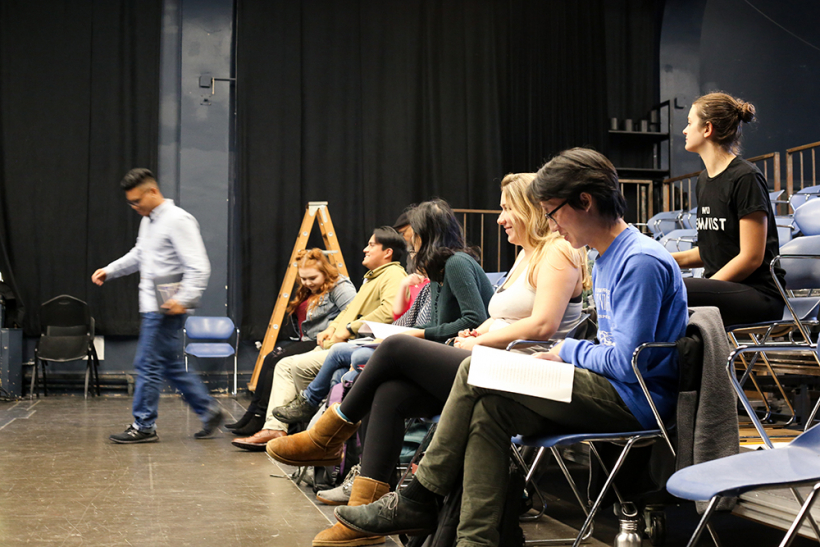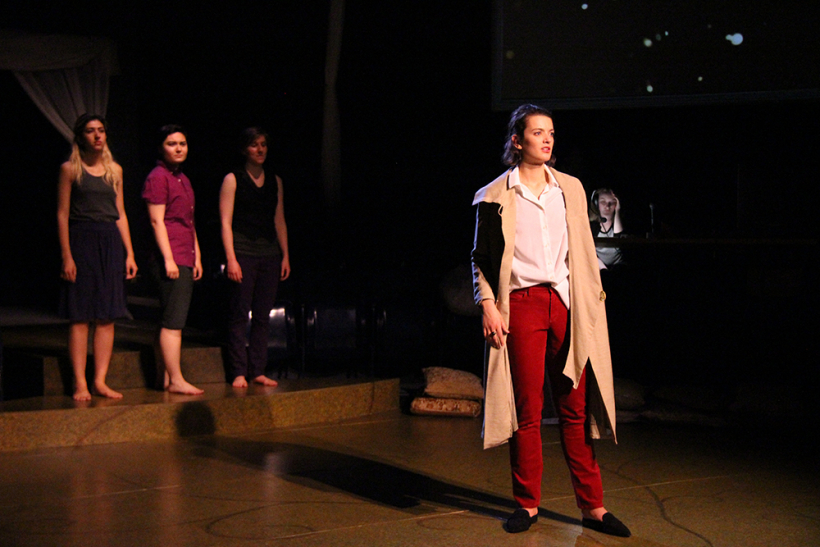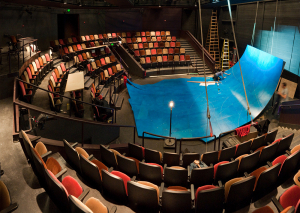
[Romeo and Jules, 2019 / Photo by Kyler Martin]
We strongly believe that the best theatre artists have a solid grounding in all aspects of the form, as well as a broad understanding of the world, and this is why we offer a well-rounded liberal arts degree that encourages students to experience every aspect of theatre-making and dramatic scholarship, while also getting out of our building and exploring everything the UW and the greater Seattle community have to offer.
We’re looking for students who want to become exceptionally capable collaborators, leaders, and innovators, and who want to study and make art that is in conversation with the world. Our graduates go on to careers in theatre, film, television, and new media, but our degree is also excellent preparation for all kinds of professions, and we have alumni who are now working as lawyers, teachers, politicians, business people, writers, and tech innovators, just to name a few.
Those who want to pursue theatre should know that the School of Drama has close ties to the Seattle theatre community. Our faculty and alumni have founded or currently hold leadership positions in many of our region's theatres, and a UW Drama degree is a proven portal to a career in the arts.
We have designed the major so that students can access the hundreds of diverse course offerings at the University of Washington. We are a "double-friendly" major--about half of our undergraduates double major with subjects as diverse as Business, Communications, and Biology. We also offer a 25-credit minor in acting, performance studies, or design for performance.
CORE COMPETENCIES
You will graduate from the UW School of Drama with:
- A specific knowledge and understanding of theatre history and literature. (You'll read a lot of plays while you're here!)
- An understanding of the methodologies behind traditional and new modes of performance
- A creative process of your own that emphasizes collaboration and critical thinking
- A spirit of intellectual and imaginative inquiry
PROGRAM OF STUDY
The Drama major offers three options:
Drama
Drama Performance
Drama Design
Within each option, students will study a mix of acting, technical theatre, theatre history, dramatic literature, and electives. Drama elective courses include courses in intermediate and advanced level acting, design, technical theatre, stage management, directing, approved internship experiences, and more. For BA core requirements, see the Undergraduate BA Drama Home Page .
The BA program is projected to be a four-year degree, although some students have found it to take longer. Duration in the program can be affected by the timeliness of the major declaration, amount and type of transfer credits, if any, and quarterly credit load.
The faculty encourages drama students to complete the required core courses as early as possible to allow maximum opportunity for advanced level coursework and enrichment during the senior year.
MORE ABOUT EACH OF OUR UNDERGRADUATE OPTIONS
Drama

Students in Advanced Acting Class
Photo by Kyler Martin
Drama majors complete a core course of study in acting, design and technical theatre, theatre history, literature, and criticism, and running crew. They may then select electives from all of the upper-level course offered in the School, including design, production, acting, directing, history and criticism, playwriting, research, and internship. They also complete General Education requirements established by the College of Arts and Sciences.
See all classes
DRAMA PERFORMANCE

Orlando, 2016
Photo by Isabel Le
Drama-Performance majors complete a core course of study in acting, design and technical theatre, theatre history, literature, and criticism, and running crew, plus additional required courses, including Stage Management and advanced Acting. They round out their degree with elective credits from all of the upper-level course offered in the School, including design, production, acting, directing, history and criticism, playwriting, research, and internship. They also complete General Education requirements established by the College of Arts and Sciences.
See all classes
DRAMA DESIGN

Students in Costume Design class
Photo by Isabel Le
Drama-Design majors complete a core course of study in acting, design and technical theatre, theatre history, literature, and criticism, and running crew, plus additional required courses, including Stage Management, advanced Design, and additional running crew. They round out their degree with elective credits from all of the upper-level course offered in the School, including design, production, acting, directing, history and criticism, playwriting, research, and internship. They also complete General Education requirements established by the College of Arts and Sciences.
See all classes
WHO WE ARE
Meet our faculty

Explore our space

Meet some recent graduates

ADMISSION REQUIREMENTS & APPLICATION PROCEDURES
UW Office of Admissions has information on applying to the University of Washington.
Undergraduates entering the BA program in Drama must first be admitted to the University.
Admission to drama major status requires completion of Drama 201.
No audition is required to declare a Drama major. (Auditions are required, however, for such classes as intermediate and advanced level acting.)
To learn more about the BA program, meet with a current student, or arrange to sit in on a class, please email emboyle@uw.edu.
DRAMA SCHOLARSHIPS
Full-time undergraduate drama majors may apply for a variety of annual School of Drama scholarships. Applications are available early spring from the advising office, and awards are determined by a faculty committee on the basis of demonstrated merit, talent, financial need and contribution to the School.